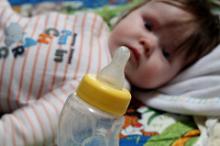
The UK Royal College of Paediatrics and Child Health responds in today's Lancet to criticism from WHO director Anthony Costello and CHIFA lead moderator Tony Waterston on conflict of interest re infant formula sponsorship.
Members of the CHIFA global child health forum (the sister forum to HIFA) had expressed dismay in recent months over the decision of the RCPCH to accept sponsorship from infant formula manufacturers. They argued this was in breach of the WHO International Code on Marketing of Breast-Milk Substitutes. A CHIFA member representating the Ghana Paediatric Society wrote: "I find this development heartbreaking. As one of the people who fought hard for the Paediatric Society of Ghana not to accept funding from IFMs 2 years ago, I can see that the next time this comes up the response will be "If the Royal College with all its funding is accepting sponsorship form IFMs, how can we, with all our financial challenges, refuse?".
The RCPCH have now declared that the infant formula manufacturers 'Danone, Abbott, Nestle and Mead Johnson... will not be able to have a stand at the 2017 RCPCH Annual Conference [to be held in Birmingham UK on 24-26 May 2017]'.
Here is Tony Waterston's message today on the CHIFA forum:
In today's Lancet, the President of the Royal College of Paediatrics and Child Health (RCPCH) with four colleagues reply to the criticisms of Dr Anthony Costello and other senior officers from WHO made in the Lancet on February 11th (previously reported on CHIFA).
The grounds for the WHO criticism of RCPCH acceptance of funding from the baby food industry were the breaching of the WHO International Code and relevant WHA resolutions, the conflict of interest which would ensue, and the difficulties of a paediatric association carrying out 'due diligence' (meaning checking which companies are breaching the Code).
In The Lancet today there are seven letters in response to the original WHO letter, three of them in support of the RCPCH (including one from the RCPCH President and one from a representative of the food industry) and four in support of the WHO critique, including one from myself and colleagues and one from Bangladesh paediatricians.
These letters can be found at the following links and key quotes are given below.
Professor Modi (RCPCH President)
Savage (World Alliance of Breastfeeding Action)
Parry et al (Public Health, North Carolina)
Talukder et al (Centre for Woman and Child health, Dhaka, Bangladesh)
Modi: 'We believe that dialogue and collaboration, not isolation and non-engagement, are the way forward to benefit babies around the world.' (please note that Modi's declaration of interest includes funding from Nestle)
O'Brien: 'Health-care professionals are experienced individuals who obtain information and support from many sources. The assertion that they need to be further protected from industry, above and beyond the rigorous safeguards already in place, demonstrates the authors' lack of confidence in the integrity and professionalism of health-care professionals.'
Savage: 'The RCPCH should give an exemplary lead to the profession, and to fellow organisations in other countries, to stand up to the infant formula industry in accordance with the International Code of Marketing of Breast-milk Substitutes, and it should find other sources of financial support that are free from conflict of interest.'
Taludker: 'Whenever members of the RCPCH now sit on policy-making committees, we fear that their opinions will be tainted by conflicts of interest. We therefore add our voice to the growing number of concerned professionals from across the world who are asking the RCPCH to reverse its decision to continue taking financial assistance from BMS manufacturers.'
The RCPCH has just announced its policy on due diligence. This states that 'The evidence provided to date has not given sufficient assurance to enable the RCPCH Board of Trustees Due Diligence sub-group to conclude that Danone, Abbott, Nestle and Mead Johnson are meeting the criteria above. Therefore these companies will not be able to have a stand at the 2017 RCPCH Annual Conference. '
This statement is welcome. We wait to hear whether this exclusion of manufacturers of breast milk substitutes will be permanent.
Please report on CHIFA your own experience with paediatric associations in relation to funding from the baby food industry."
We congratulate Tony Waterston, Anthony Costello and CHIFA members for their compelling advocacy on this issue. This is encouraging to all of us who are concerned about the negative impact of commercial interests (whether infant formula, pharmaceutical, tobacco, junk foods or other) on public health. Join CHIFA (free) to continue the discussion.
Photo credit: Bradley Gordon, with thanks.

